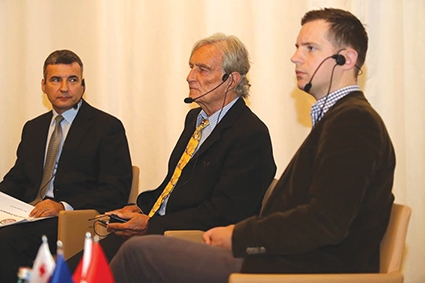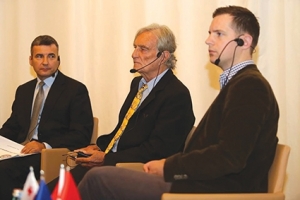Prioritizing Life, not Cars: International Road Safety Conference Held in Tbilisi
An International Road Safety Conference entitled ‘Recent Situation and Future Vision’ was held in Tbilisi on October 30. Organized by the Georgian Alliance for Safe Roads and supported by the Polish Embassy and Embassy of Switzerland in Georgia, the event gathered some of the highest ranking government officials, diplomats and international experts, alongside private and public sector respresentatives, to discuss the current road safety issues in Georgia through panel discussions, thematic workshops and round-table discussions.
“The day-long road safety conference tackled so many different aspects of road safety in Georgia,” Maya Kobalia, Executive Director, Alliance for Safe Roads Georgia, told GEORGIA TODAY. “Bringing together numerous different representatives from the ministries of Internal Affairs, Economy, and Environment, Tbilisi Municipality, Swiss and Polish experts, foreign diplomats, we discussed economic, social and other areas of road safety, from making our city more pedestrian-friendly to periodic technical inspections and legislation and enforcement. It was an opportunity to share expertise from Switzerland and Poland, where, with good enforcement and with the strong will from government, road safety became a priority”.
The conference was opened by Ekaterine Laliashvili, Chair of the Board at Georgia’s Alliance for Safe Roads, who spoke about the importance of the upcoming reform on the technical inspection of transport vehicles, which, she said, is expected by many to have a direct impact on improving the air quality in Georgian cities.
“There’s no time left to wait: we have to work faster to implement this reform successfully, and this request goes out to all the decision-makers involved,” she said. “The aim of this conference is to discuss and evaluate the reality we’re facing, to plan our next steps, and to analyse the challenges within”.
Shalva Khutsishvili, Deputy Minister of Internal Affairs of Georgia, pointed out that the traffic safety campaign initiated by his ministry ‘For the Sake of You and Your Safety,’ run in cooperation with the non-governmental sector alongside numerous other actions and efforts undertaken, proved extremely successful and resulted in a decrease in road accidents by 10% in the first nine months of this year.
“It is important to maintain this dynamic,” he said. “We managed to successfully implement the 100-point driving and contactless patrolling systems, and smart cameras began operating from November 1st. Our vision is that in three years’ time, road traffic administration will be operated by technologies while the role of the patrol police will be directed more towards crime prevention”.
Davit Narmania, Mayor of Tbilisi, also one of the key speakers at the conference, talked about the safe city concept, and the important role the city municipality has to play in its development, paying particular attention to road infrastructure improvement. Narmania, who is soon to be replaced by newly elected Kakhi Kaladze, who also attended the event, introduced an overview of the projects already realized, highlighting the Pekini Street rehabilitation.
“By the end of 2017, smart traffic lights will be installed in 149 places across Tbilisi,” Narmania said, going on to talk about the municipal transport projects both complete and being planned for future implementation.
“I’m sure that with combined efforts, our city will become safer, and all of us will be obeying road safety rules more; pedestrians, car drivers and cyclists, achieving better results to make our city safe,” he concluded.
The conference continued with Mariusz Maszkiewicz, Ambassador of Poland to Georgia, and Lukas Beglinger, Ambassador of Switzerland to Georgia.
While Ambassador Maszkiewicz shared his not-so-positive personal experience of driving on the Georgian capital’s roads, he went on to underline that Poland had similar issues not so long ago.
“I realze that this way of driving is somehow connected to the many experiences of the situation that Georgia had in the past, with law-breaking seen in both political and social life…in short, people were simply not used to driving correctly,” he said, going on to highlight the need for a long-term governmental strategy, a strong program that “will improve and recover the climate of the law regarding road safety”.
“We, together with our experts and those from Switzerland, would like to assist you to find the best way to work with society to improve the traffic situation,” the Polish Ambassador said.
“The Government of Georgia and the authorities at the municipal level have shown their willingness and resolve to take action in cooperation with other actors and in particular with civil society, and this conference is an opportunity to compare with and possibly learn from the countries that started with similarly bad conditions,” said Ambassador Beglinger. “I think Poland is very good case study of a similar situation successfully turned around,” he added, going on to recount how he first came to serve in Poland after the Balkans and was shoked by the road safety in the country. “Now the change is visible [there], reflected in the figures, with a drastic reduction in the number of road accidents”.
Switzerland has supported a road safety project in Poland which, Beglinger says, “greatly contributed to diagnosing the problems” and resulted in a successful broad-based approach being applied. “It’s not just about road infrastructure or how the police works, it’s about many factors, like, for instance, how the courts work so that people who violate rules can be punished. And it’s about education,” he concluded.
The conference went on with the speeches and two panel discussions, with the participation of Archil Talakvadze, Leader of Parliamentary Majority; Ekaterine Grigalava, Deputy Minister of Environment Protection of Georgia; Roland Wiederkehr, Road Safety Expert, Switzerland; Zdzisław Sudoł, Head of Road Safety Department at State/National Police, Poland; Rafał Wasiak, Inspector from Poland; and Joseph Alexander Smith, British journalist and public activist who currently resides in Georgia.
“The basic question is, whether Tbilisi is for people or for motor vehicles,” Rafał Wasiak said. “My first impression was that this city is for cars: not so many traffic lights and rivers of cars moving from one direction to the other.”
He emphasized that in Eastern European countries, the main political target is to make cities more and more pedestrian friendly, where for example, like in Warsaw, downtown is closed to traffic during weekends.
Joseph Alexander Smith spoke about how unsafe, uncomfortable and unadjusted Tbilisi is for cyclists, and showed attendees a short video of his bicycle ride from one part of the city to another in traffic.
“We have 1.3 million people dying on the roads globally every year and more than 30 million heavily injured people,” Roland Wiederkehr, a Swiss expert, said, adding that Georgia pays around $450 million annually for the short-term and long-term results of road accidents.
“40 years ago, we in Switzerland had the same obstacles that you have today,” he said. “We didn’t have much traffic but we had 1,700 fatalities per year. Today, with the explosion in traffic, it is three-four times more, but we only have 210 fatalities a year on average, so it is possible to achieve”.
“I think it’s one of the obligations of Switzerland, the country which created the Red Cross, to do something for ‘road cross’ and help other countries to overcome such obstacles,” Wiederkehr said, going on to describe how Switzerland helped Poland with 4 million Swiss Francs, through exchange programs for Polish police and NGOs, and exchange visits of Swiss experts to Poland to share their experience on how to improve road safety in the country.
“We also invite you to start an exchange program together with the Polish police, together with Swiss police and Polish NGOs,” Wiederkehr suggested.
“Road safety has so many different aspects, it needs careful analysis and planning. Education must be set in schools, special prevention days need to be organized, like in Poland and Switzerland,” he later told GEORGIA TODAY.
“First of all, there needs to be political will to make such an exchange and then we can start making a plan. The priority here in Georgia is still given to cars, and that’s wrong. It shouldn’t make the same mistakes we did. But we’re changing now and we give priority to life in the cities: life and not cars and machinery, which is also a fantastic thing for tourism,” Wiederkehr concluded.
Nino Gugunishvili












